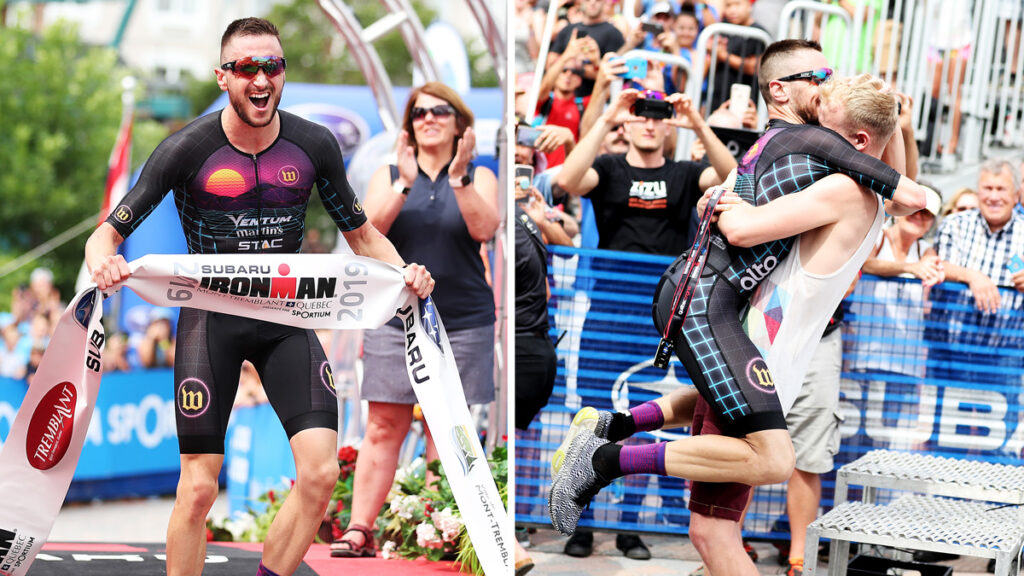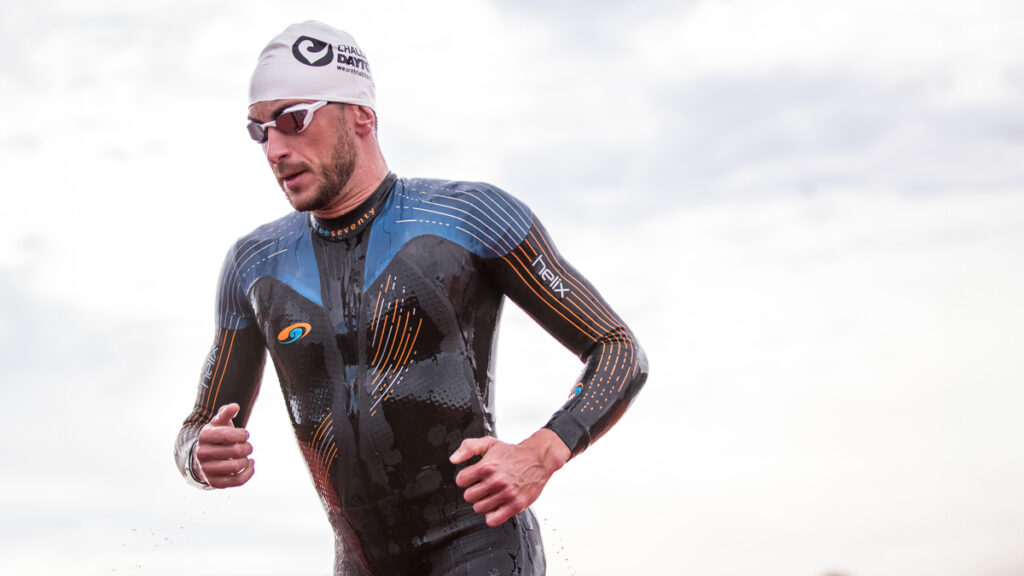I wasn’t trying to make a statement, let alone the news, when I leapt into my partner’s arms after breaking the tape at IRONMAN Mont Tremblant. Our celebration was just the first of thousands of emotional finish-line moments that day, yet it garnered nearly as much attention as my breakthrough performance simply because we’re both men. To younger me, this scene would have been a ray of hope.
I’m Cody Beals, a 12× IRONMAN and 70.3 Champion and one of the few openly gay professional triathletes. Here’s my story about coming out, the current landscape of endurance sports, and why representation matters.

Seeing Myself as an Athlete
I’ve always been immersed in sports, but I used to feel like an imposter in most athletic spaces. Growing up in small-town Ontario, I was already an outsider for hanging out at pools and trails rather than rinks and fields. The flickering awareness of my orientation added to my sense of otherness.
I was drawn to individual sports as much as I felt driven to them. Team locker room talk was jarring and the subset of masculinity on display wasn’t me. I also found the one-dimensional portrayals of queer characters in most media just as unrelatable. From the athletes around me to the stars I looked up to, it seemed like sports were for straight men. I lacked the confidence to forge my identity without seeing myself among my peers, let alone my role models.
Hiding is Harmful
To be clear, I had it relatively easy. A white, cisgender, gay kid from an accepting family in 21st-century Canada isn’t exactly “hard mode” for queer folks. Despite my privilege, my path to self-acceptance was still tortuous.
Who we love is just one part of our personal identity, but it profoundly affects how we move through the world. As much as I downplayed the significance of being closeted in the past, I now see how much it ate at me. I not only cut dating out of my life, but I also socially self-isolated almost completely. I threw myself into my training and studies with compulsive fervor.
I thought I was productively channeling my angst into a savage training program during those years. In reality, my existence of overtraining, undereating, anxiety and insomnia was self-abusive. My physical health paralleled my deteriorating mental health, and I was diagnosed with RED-S, among other complications. I was superficially successful but deeply unwell.
The Significance of Coming Out
A common misconception is that coming out is a discrete, singular event. It’s really an ongoing series of decisions for any queer person. Who needs to know? How should they find out? How will they react? This constant calculus can be draining. It’s not surprising that queer folks tend to become adept at code-switching as a defense mechanism.
People, including professional athletes, approach coming out in a variety of ways. For some, it’s with fanfare, rainbows and glitter. For others, it’s understated or spontaneous. Some even posit that we’re reaching a post-label society, though I still see that as a fantasy. I’m just grateful that options exist. Queer people didn’t get to decide when or how they came out until recent history, and many still don’t. I kicked the can down the road for years. By my 25th birthday, I was struck by the realization that coming out was my greatest barrier to an authentic and fulfilling life.

Accepting myself and coming out were integral steps in my personal development. As a young adult, I used training as an outlet for anxiety, frustration and isolation. I wondered if I’d lose my edge without this fire to temper it. But coming out and finding a meaningful relationship drastically improved my mental health. Many interconnected pieces fell into place and it showed as I climbed the ranks of triathlon.
Are Endurance Sports Inclusive?
Being a pro triathlete who is openly gay has overwhelmingly been a non-issue for me. I feel privileged that I can be myself around my family, friends, fans and sponsors. I can count the instances of homophobia I’ve experienced on one hand. However, I can only speak from my experience, and the queer community certainly isn’t a monolith.
Sports have the power to transcend backgrounds, beliefs, identities, and ideologies. Other athletes care more about my performance than who I kiss at the finish line. After all, we’re completing the same course and crossing the same finish line. It’s a great equalizer. At the same time, many endurance sports, particularly triathlon, are quite homogeneous with respect to characteristics like orientation, race and socioeconomics. These demographics alone can make our communities seem less welcoming to outsiders.
Is Gay Good for Business?
Many companies are eager to position themselves as inclusive and pro-diversity these days. This messaging usually strikes me as genuine and impactful, though some initiatives smack of rainbow-washing. Many queer athletes have successfully leveraged their orientation to attract sponsorship, media and fans. In my experience, being an openly gay athlete has been an asset rather than a liability with respect to business opportunities.
I have mixed feelings about capitalizing on my orientation. I’m proud of who I am, but I’d rather be known for my other attributes — my racing, my approach, my transparency. I’ve declined opportunities and interviews that centered on being gay. I still walk on eggshells around the topic, though that reflects my own vulnerability rather than our community’s response.

Representation Still Matters
A lack of queer representation in athletic spaces contributed to my feelings of alienation and my regretfully long time in the closet. Every time I’m open about my orientation, from that finish line celebration to an article like this, I receive touching feedback. I hear from queer folks (and their allies) that representation helps them feel welcome and empowered.
Athletic spaces remain intimidating for many queer people. They may carry painful memories or even traumatic associations. Reclaiming these spaces can be healing.
The positive effects of representation extend to anyone who identifies with some form of otherness. I still find it challenging to put myself out there. If my visibility as an out pro athlete helps people like younger me feel more comfortable in their skin and in their sport, then the discomfort I feel is worth it.










